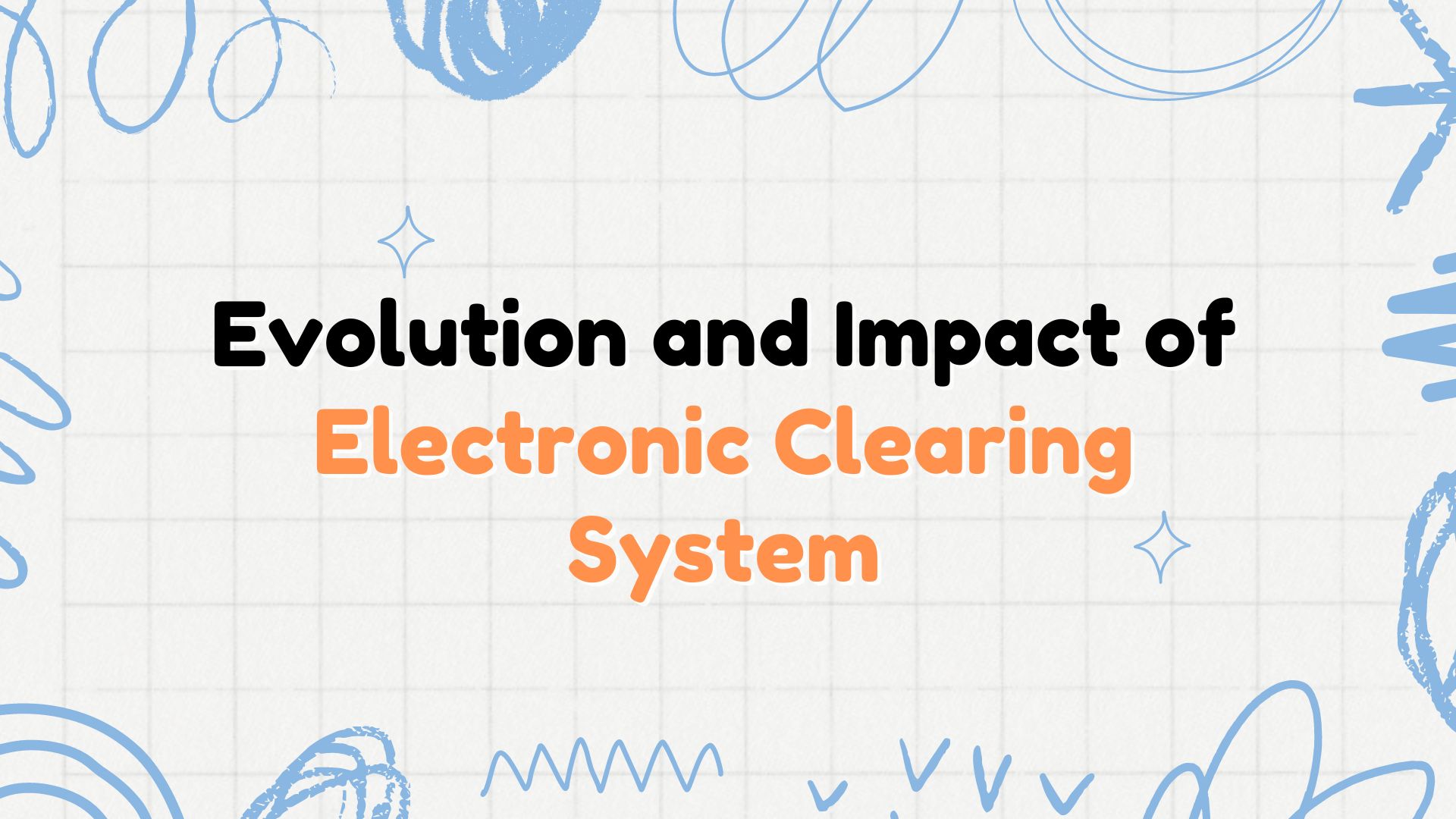In the realm of financial transactions, efficiency and
accuracy are paramount. The advent of the Electronic Clearing System (ECS) has
revolutionized the way transactions are processed, providing a robust framework
for the seamless movement of funds. This article delves into the evolution,
mechanics, benefits, and future prospects of ECS, highlighting its pivotal role
in modern banking and commerce.
The Evolution of Electronic Clearing System
The Electronic Clearing System is a mode of electronic funds
transfer from one bank account to another using the services of a
clearinghouse. ECS was introduced by the Reserve Bank of India (RBI) in the
early 1990s as part of the efforts to improve the efficiency of financial
transactions in the country. Initially, ECS was primarily used for bulk
transactions, such as salary payments, pension disbursements, and dividend
distributions. Over the years, its scope has expanded significantly to include
a wide array of regular payments such as utility bills, insurance premiums, and
loan EMIs.
Mechanics of ECS
ECS operates in two distinct variants: ECS Credit and ECS
Debit.
1. ECS Credit: This is primarily used for bulk payments. For
instance, a company disbursing salaries to its employees will instruct its bank
to transfer the specified amounts to the respective accounts of the employees.
The bank consolidates these instructions and sends them to the clearinghouse,
which then forwards them to the banks of the beneficiaries. The funds are
credited to the recipients' accounts on a predetermined date.
2. ECS Debit: This is used for the collection of payments.
Utility companies, for instance, can collect payments from multiple customers
by initiating a single debit instruction to their bank. Customers authorize the
service provider to debit their accounts for the payment of bills. The bank
then processes these debits through the clearinghouse, ensuring that the funds
are transferred from the customers' accounts to the service provider's account.
Benefits of ECS
ECS offers a multitude of benefits for both businesses and
consumers, making it an integral component of the financial ecosystem.
1. Efficiency and Speed: ECS drastically reduces the time
taken for transactions, eliminating the need for physical instruments like
checks. This ensures quicker crediting and debiting of accounts, enhancing
liquidity for businesses and convenience for consumers.
2. Cost-Effectiveness: By minimizing the reliance on
paper-based transactions, ECS reduces operational costs associated with
printing, dispatching, and handling physical documents. This cost efficiency is
beneficial for both financial institutions and their customers.
3. Accuracy and Reliability: Automated processing through ECS
reduces the risk of human error, ensuring greater accuracy in transactions.
Additionally, the system's robust security protocols safeguard against fraud
and unauthorized access, enhancing reliability.
4. Convenience: For consumers, ECS offers the convenience of
automated payments, eliminating the need to remember due dates for bills or
EMIs. For businesses, it streamlines the payment process, reducing
administrative burdens and ensuring timely receipt of funds.
5. Environmental Impact: By reducing the need for paper-based
transactions, ECS contributes to environmental sustainability. Less paper usage
translates to fewer trees being cut down and a smaller carbon footprint for the
banking sector.
Challenges and Limitations
Despite its numerous advantages, ECS is not without its
challenges. Understanding these limitations is crucial for further improving
the system.
1. Dependency on Internet and Technology: ECS relies heavily
on internet connectivity and technological infrastructure. In regions with
limited access to these resources, the adoption and effectiveness of ECS can be
hindered.
2. Security Concerns: While ECS is generally secure, the
increasing sophistication of cyber-attacks poses a continual threat. Financial
institutions must constantly update their security measures to safeguard
against breaches.
3. User Awareness and Acceptance: Some consumers,
particularly those in rural areas or older demographics, may be hesitant to
adopt ECS due to a lack of awareness or mistrust in electronic systems.
Ensuring widespread education and trust-building measures is essential for
broader adoption.
4. Technical Glitches: Like any electronic system, ECS is
susceptible to technical issues and glitches. Ensuring robust technical support
and backup measures is critical to maintaining uninterrupted service.
Future Prospects
The future of ECS is promising, with several trends and
advancements poised to enhance its functionality and reach.
1. Integration with Digital Payment Platforms: As digital
wallets and mobile banking gain popularity, integrating ECS with these
platforms can provide seamless transaction experiences. This synergy can
further streamline payment processes, offering greater flexibility and
convenience to users.
2. Blockchain Technology: The adoption of blockchain
technology can enhance the security and transparency of ECS transactions.
Blockchain's decentralized ledger system can provide an immutable record of
transactions, reducing the risk of fraud and ensuring greater trust.
3. Artificial Intelligence and Machine Learning:
Incorporating AI and machine learning can improve the efficiency and accuracy
of ECS. Predictive algorithms can optimize transaction processing, while
machine learning models can detect and prevent fraudulent activities.
4. Expansion to Global Transactions: With the globalization
of commerce, expanding ECS to facilitate international transactions can open
new avenues for businesses and consumers. Developing a framework for
cross-border ECS transactions can simplify global trade and enhance economic
integration.
Conclusion
The Electronic Clearing System has undeniably transformed the
landscape of financial transactions, offering a blend of efficiency, accuracy,
and convenience. While challenges remain, continuous advancements in technology
and infrastructure promise to further enhance the capabilities and reach of
ECS. As the financial sector evolves, ECS stands as a testament to the power of
innovation in driving progress and shaping the future of banking and commerce.

